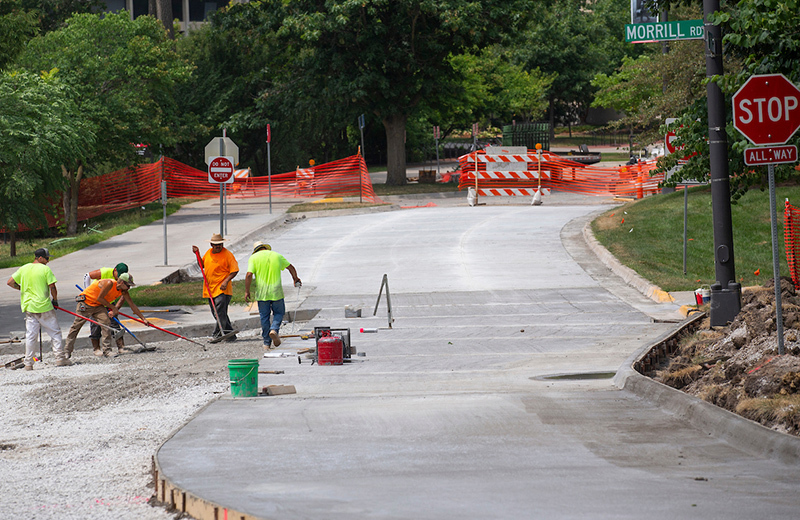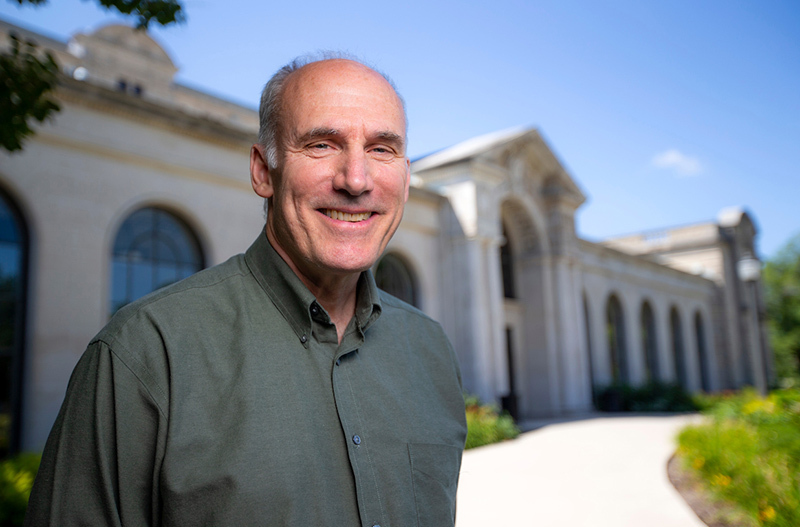It's nearly go-time

Photo by Christopher Gannon.
Crews prepare the road bed for another concrete pour Monday afternoon at the intersection of Morrill Road (pictured, looking north) and Union Drive. An extended version of the intersection closed July 8 to repair the deteriorating road, and the Morrill leg of the project is nearly complete. The contractor currently is installing a new storm sewer under Union Drive north of Lake LaVerne, with additional sections of roadway prepped and paved as they become available. The project is on schedule for completion next week (Aug. 16), with the roads reopening Monday morning, Aug. 19.
New budget relies on reallocations
The operating budget university leaders built for the new fiscal year will rely more on reallocations than new revenue to achieve top priorities and needs. Meeting telephonically Aug. 1, the state Board of Regents approved an Iowa State budget that includes $10.1 million in incremental revenue and $8.1 million in reallocations to cover priorities such as salary increases, faculty promotions and support for academic programs as well as mandatory cost increases. An additional $12 million in reallocations created the 10 service teams that launched July 1 in the improved service delivery model.
President Wendy Wintersteen's top budget priority, salary increases for faculty and staff, will cost about $7.8 million. The July 1 and Oct. 1 salary increases for faculty, professional and scientific staff and post docs will cost an estimated $7 million; the July 1 increase for merit staff about $816,000.
Wintersteen told the regents Iowa State will enroll fewer students this fall than a year ago, causing a decline in base tuition revenue despite rate increases. However, that will be offset by additional differential tuitions for students in engineering, business, industrial technology, architecture and other programs that cost more to offer. That differential tuition, approximately $6.7 million, will go directly to the respective programs to maintain or enhance their quality.
Wintersteen said she wants Iowa State to be known for student innovation and entrepreneurship across all colleges and disciplines, not just its STEM programs. A much-anticipated priority is the spring opening of the Student Innovation Center.
"Students and faculty will have an exciting hub to test theories, build prototypes, pitch ideas and spin off exciting new businesses to help grown Iowa from the ground up," Wintersteen said. With more than 18,000 ISU students each year coming from within the state -- and nearly two-thirds of them typically remaining in Iowa after graduation -- "Imagine the impact they will have on the future of this state when they take their innovations and entrepreneurial ideas to the next level."
Reallocations will fund the estimated $1.4 million cost of opening the Student Innovation Center.
FY20 General Fund: Incremental revenue
|
State funding |
$5.125 million |
|
General university |
$4 million |
|
Vet Diagnostic Lab operations |
$300,000 |
|
Biosciences Initiative |
$825,000 |
|
Tuition (net) |
$4.579 million |
|
Research facility and administrative costs recovered |
$534,000 |
|
Miscellaneous income |
-$100,000 |
|
Total |
$10.138 million |
FY20 General Fund: Strategic and other costs
|
Salary increases |
$7.808 million |
|
Faculty, P&S, post docs |
$6.992 million |
|
Merit contract |
$816,000 |
|
Maintain, enhance quality of academic programs |
$6.680 million |
|
Vet Diagnostic Lab operations |
$300,000 |
|
Biosciences Initiative |
$825,000 |
|
Student financial aid |
$241,000 |
|
Academic and support services |
$295,000 |
|
Opening Student Innovation Center |
$1.398 million |
|
Annual cost increases* |
$667,000 |
|
Internal reallocations |
-$8.076 million |
|
Total |
$10.138 million |
*Examples: insurance premiums, CyRide subsidy, fire protection contract
Big picture
Iowa State's general fund operating budget for the year that began July 1 is $742 million, an increase of about 1.4% over a year ago. The top revenue sources are tuition and fees ($471.3 million, 64%) and state appropriations ($230.6 million, 31%), nearly identical ratios to the last few years. The restricted budget, made up primarily of auxiliary units and other operations that receive no state funding -- residence, athletics, parking or the bookstore, for example -- is nearly $787.9 million this year. The restricted side of the budget includes state appropriations totaling $19.5 million for two building projects:
- $12.5 million for a new Veterinary Diagnostic Lab, year two of a six-year commitment
- $7 million for the Student Innovation Center, year four of a six-year commitment
Iowa State's overall budget is $1.53 billion, an increase of about 1.6% over last year's budget. About 60% of the growth is in restricted budgets.
Other business
The regents unanimously approved ISU requests to:
- Begin planning a new teaching, research and faculty office building on the west edge of campus for the industrial and manufacturing systems engineering department. The department currently shares Black Engineering Building with the mechanical engineering department, and a 2014 space study indicated both departments need more space. The estimated cost, about $40 million, would be covered by private gifts.
- Purchase an 18,200-square-foot warehouse on about four acres at 2105 East Lincoln Way to serve as ISU’s central receiving facility. It currently shares a building on Airport Road with the surplus unit. The proposed price is $1.45 million, covered with lease revenue funds.
- Lease to the city of Ames, for $1 annually, 9.5 acres at the northwest corner of the Scholl Road/Ontario Road intersection so the city can develop it for the proposed Healthy Life Center. This lease would be the university's contribution to the project.
- Change the name of two master's programs, for consistency. The master of engineering and master of science programs in information assurance would become the master of engineering and master of science in cybersecurity. The change aligns with the new bachelor's degree in cybersecurity.
Welcome

Photo by Christopher Gannon.
Brendan O'Brien began serving as director of the international students and scholars office on Aug. 1. He leads a staff responsible for providing immigration and cross-cultural expertise for international students and scholars throughout their Iowa State years.
O'Brien comes to Iowa State from Cornell University, Ithaca, New York, where he served for 29 years in the university's international students and scholars office, first as associate director (1989-98) and then director (1998-2018).
He earned a bachelor's degree in history from Hobart College, Geneva, New York, and a master's of public administration (concentration in comparative and international development) from the State University of New York, Albany.
O'Brien's office is in 3242 Memorial Union. He can be reached by phone at 294-1120, by email at brendano@iastate.edu.
P&S Council considers strategic initiatives for 2019-20
The Professional and Scientific Council will focus on four broad priorities in the upcoming year, if it approves a set of strategic initiatives members reviewed at their Aug. 1 meeting.
The initiatives the council hopes to tackle in 2019-20 include improving employee engagement, strengthening advocacy, making pay and benefits more competitive, and creating a more supportive and welcoming work environment. The initiatives were proposed by the council's executive committee, incorporating goals members identified in small-group sessions at their July 11 meeting.
Here's the full text of the initiatives:
- Expand efforts with university leadership to improve employee engagement, retention and satisfaction through effective supervisor training and support including hiring practices, robust employee evaluations, campus climate, as well as compensation inequities across departments and divisions.
- Strengthen advocacy efforts and involvement in universitywide initiatives impacting P&S employees including the classification and compensation review process, improved service delivery (ISD) implementation, WorkCyte implementation, and the university budget model.
- Advocate for competitive employee compensation and benefits as well as policies/procedures that make our workplace attractive including flexible work hours, telecommuting, professional development, and other benefits.
- Continue to build and cultivate the P&S employee experience to create a work environment where employees are safe and feel welcomed, supported, included, and valued by the university and each other.
The council will consider approving the motion endorsing the initiatives at its Sept. 5 meeting.
Workday, ISD update
A trio of senior administrators updated the council on Workday and ISD, which both went live July 1. Much of the discussion centered on ServiceNow, the new software system used to track service requests for finance, human resources and information technology.
According to data through the morning of July 31 shared by interim vice president and chief information officer Kristen Constant, 24,125 requests had been submitted since ServiceNow launched May 19, at first just for handling IT issues. Only 11.8% of those requests remained active, meaning they are open, on hold or new. ServiceNow was expanded July 1 to human resources, finance and Workday issues, which generated 11,691 tickets, 15.1% of which remained active.
Interim senior vice president for operations and finance Pam Cain encouraged employees to be patient and avoid putting in multiple tickets for the same issue, as service team specialists have a backlog of requests. Interim vice president for university human resources Kristi Darr said HR specialists also had a significant workload in July, as they caught up with personnel changes temporarily put on hold during the transition to Workday.
"We're working through them," Cain said. "We'll get there."
If a ticket is marked as closed despite lingering concerns, reply to the email generated by the ServiceNow system and explain why the ticket shouldn't be closed, Constant said.
A running list of reported issues in progress helps track campuswide concerns with the Workday transition, which Cain said involved transferring more than 540,000 individual data points. Darr reminded employees to check their records in Workday to make sure everything is accurate, as they know the information better than anyone.
"That's really important to us," she said.
Responding to a question about reports available in Workday, Cain said staff are working to resolve security issues that have in some cases limited access. She said 30 custom reports were built in July to address specific reporting needs. In many cases, though, a report already available in Workday will provide the necessary data, Constant said.
"We have an awful lot out there. It's pretty likely one exists that would work for you. We just have to help you find it," Constant said.
Oversight for Iowa State Center moves to athletics
Editor's note: This story was a late addition to the Aug. 1 edition of Inside Iowa State. For readers who missed it last week, we post it again in this edition.
Management of the Iowa State Center transferred to the athletics department from the division of operations and finance, effective Aug. 1.
VenuWorks has managed operations for the Iowa State Center since 2015. Iowa State will continue to partner with the company for event management at Stephens Auditorium, Fisher Theater and the Scheman Building through the duration of the current contract, which expires June 30, 2020, and will use this time to explore the possibility of future partnership opportunities with VenuWorks. Iowa State Center staff will continue to serve in their positions.
The transition is part of ongoing efforts to create greater efficiency, productivity and innovation in university programs and services. The athletics department already was managing Jack Trice Stadium and, since 2008, Hilton Coliseum.
"Combining operations of our athletics venues with the Iowa State Center into one management portfolio will allow for greater efficiencies in operations, enhancement of facilities and the opportunity to increase the value and benefit of the Iowa State Center," said President Wendy Wintersteen.
"The Iowa State Center is a tremendous educational and cultural asset to the university, the Ames community and central Iowa," she said. "We will continue to sustain the level of excellence and excitement expected by tens of thousands who use these facilities every year, as well as those who faithfully come to Hilton and Jack Trice to cheer on the Cyclones."
